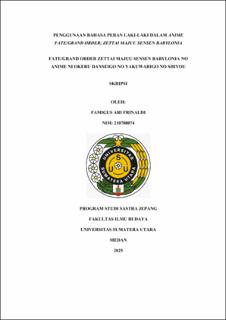Penggunaan Bahasa Peran Laki-Laki dalam Anime Fate/Grand Order: Zettai Majuu Sensen Babylonia
The Use of Male Role Languange in the Anime Anime Fate/Grand Order: Zettai Majuu Sensen Babylonia

Date
2025Author
Frinaldi, Famigus Ari
Advisor(s)
Arfianty, Rani
Alimansyar
Metadata
Show full item recordAbstract
This research discusses the analysis of Male Role Languange (Yakuwarigo) in the anime Fate/Grand Order: Zettai Majuu Sensen Babylonia. Role Languange, also known as Yakuwarigo, refers to the use of specific language patterns by certain characters in Japanese virtual media, aimed at assigning stereotypes to characters to help the audience easily understand their personality traits. This research aims to identify the types of Male Role Languange found in the anime Fate/Grand Order: Zettai Majuu Sensen Babylonia and analyze how they are used. The data for this research consists of character dialogues from episodes 1 to 4 of the anime that exhibit characteristics of Male Role Languange. The research employs a descriptive qualitative method combined with a Role Languange identification approach. The analysis reveals that the types of Male Role Languange that appear include: (boku, ore) as first-person singular pronouns, (omaetachi, kimitachi) as second-person plural pronouns, (kai) as an interrogative form, the copula (da), sentence-final particles (yo, zo, sa), and request expressions (~te kure, ~te moraitai). Each form of Male Role Languange not only reflects stereotypes of masculinity but also reveals social position, emotions, and interpersonal relationships among characters, in terms of both uchi/soto and formal/informal dimensions.
Collections
- Undergraduate Theses [605]
